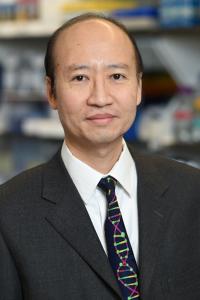Tsang Lab
Location and Contact Information
Principal Investigator
As a result of Dr. Tsang's groundbreaking metabolome reprogramming research, he has earned a reputation as one of the world's foremost authority in therapeutics of neurodegenerative disorders.
Dr. Tsang's genome engineering laboratory is engaged in tackling neurodegenerative disorders by pursuing investigations in three areas, two of which include patient-specific engineered mouse models: probing the role of phosphodiesterase (PDE) signaling in neurodegeneration, developing stem cell-based therapies for photoreceptor degeneration, and correlating the genotypes of various human retinal degenerations with the phenotypes revealed in live metabolic imaging (autofluorescence). We are also currently focused on genome engineering/CRISPR approaches to reprogramming metabolome in the retina to promote cell survival, which may be broadly applicable to retinal degenerative diseases, regardless of the mutation. While light-adapted normal photoreceptors have a highly anabolic and aerobic metabolism like the Warburg effect observed in stem cells, dark-adapted photoreceptors express a catabolism, high-ATP metabolism akin to neurons. To translate this anabolic therapy to humans, our laboratory is developing “genetic sunglasses” to promote a constant dark-adapted metabolic state in photoreceptor neurons while maintaining a normal light-dark circadian environment.
